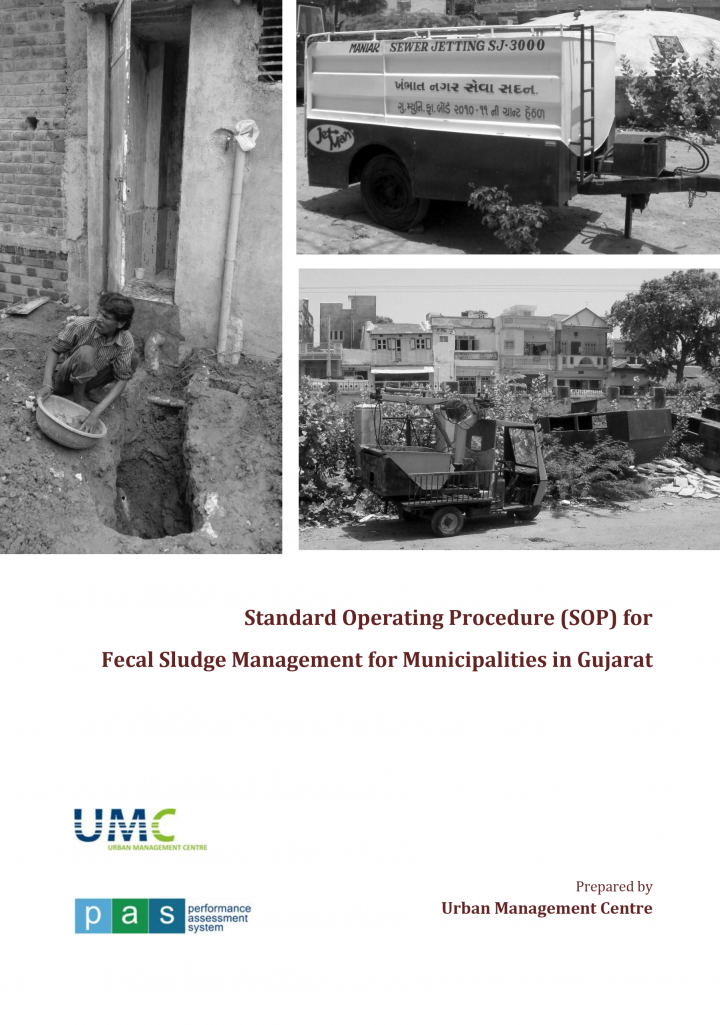Standard Operating Procedure (SOP) for Fecal Sludge Management for Municipalities in Gujarat
Urban Management Centre (UMC) (2015)

Published in: 2015
Pages: 36
Publisher:
Urban Management Centre (UMC)
Author:
Urban Management Centre (UMC)
Uploaded by:
SuSanA secretariat
Partner profile:
Deutsche Gesellschaft für Internationale Zusammenarbeit (GIZ) GmbH
1582 Views
107 Downloads
Content - Summary
Proper treatment and management of fecal sludge is integral to safe sanitation practices which ensure health and well being of citizens. According to the Census 2011 data on sanitation, around 30 million urban households, or more than one thirds of all urban India depends on on-site sanitation solutions for safe waste water disposal. In Gujarat too, the reliance on on-site sanitation systems is very high. 105 out of the 167 cities in the state do not have any underground drainage system and are dependent on technologies such as single pits, twin pits and septic tanks for waste water disposal.
Also in cities that have underground drainage network, the coverage of the underground network is limited. With rapid development, more and more properties especially in peripheral urban areas are making their own arrangements of waste water disposal. A rapid assessment of septage management in Asia carried out by USAID in 2010 revealed that about 148 million people in urban areas will have septic tanks by the year 2017. Though the National Urban Sanitation Policy (NUSP) emphasizes the need for proper collection, treatment and disposal of sludge from such on-site installations, very limited attention has been paid to the construction, management, maintenance and safe disposal of fecal sludge from these systems.
Most urban local bodies (ULBs) in India are not able to effectively monitor the regular cleaning and maintenance of septic tanks and pits. Some ULBs provide septic tank and pit cleaning as a municipal service but the supply of such desludging services is far from adequate. In many cities private players have filled this gap by providing these services for a fee. The private contractors also sometimes sell the nutrient rich sludge to farmers in the vicinity of cities. However the disposal of waste water is often not regulated. The sludge is dumped in storm water drains and open areas posing considerable health and environmental risks.
Recognizing the growing importance of safe fecal sludge management practices, the Ministry of Urban Development (MoUD) has recently released an advisory to provide guidance to states and cities on policy, technical, regulatory and monitoring aspects of fecal sludge management. The advisory is a useful resource on fecal sludge management for cities in India. In addition to the advisory, the guidelines on design and construction of septic tanks issued by the Bureau of Indian Standards (BIS) and the Central Public Health and Environmental Engineering Organization (CPHEEO) are also a good reference on technical design and maintenance of septic tanks. These standard operating procedures (SOP) borrows from these two resources as well as the team’s extensive experience of working with cities in Gujarat to establish a uniform procedure for fecal sludge management in Gujarat and present the information in a handy, comprehensive and easily accessible format.
Bibliographic information
Urban Management Centre (UMC) (2015). Standard Operating Procedure (SOP) for Fecal Sludge Management for Municipalities in Gujarat. Urban Management Centre (UMC)
Filter tags
East Asia & Pacific English Guidelines and manuals Import to Sanitation Workers Platform Urban (entire city)















